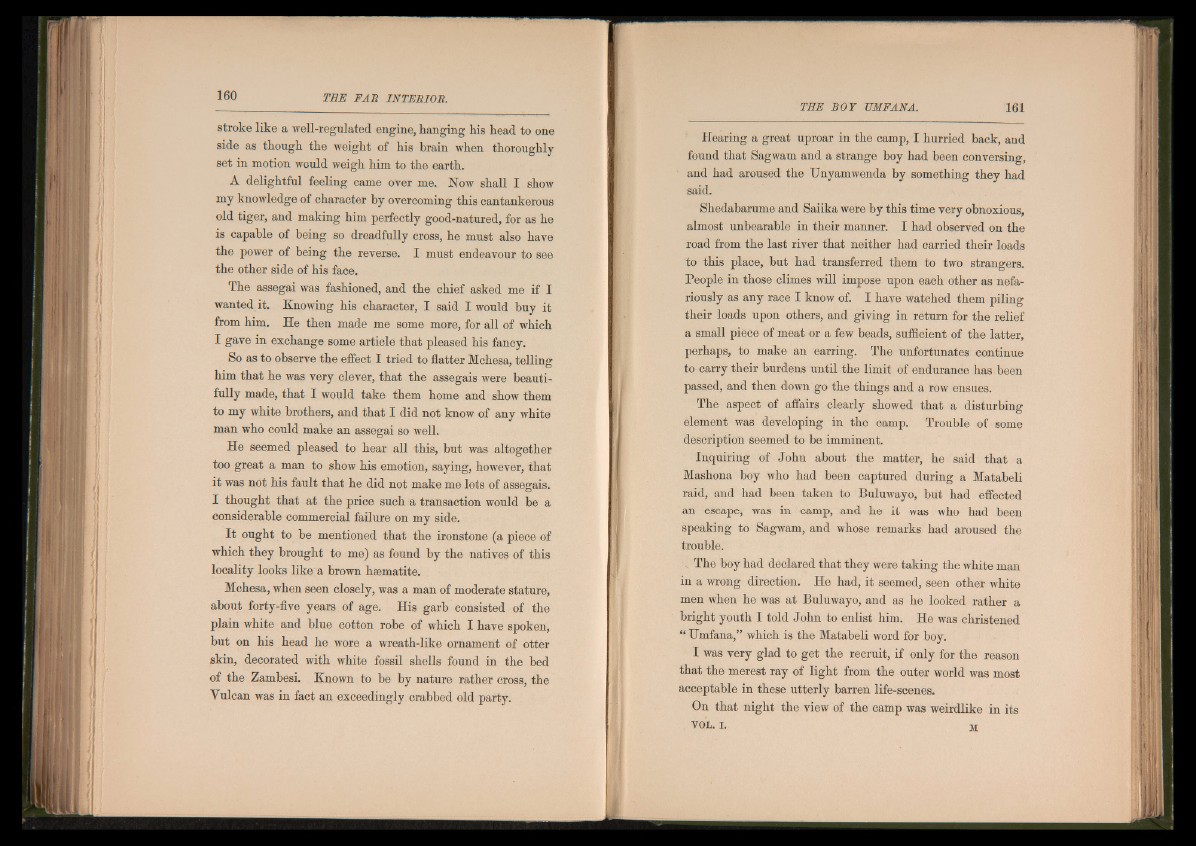
stroke like a well-regulated engine, hanging his head to one
side as though the weight of his brain when thoroughly
set in motion would weigh him to the earth.
A delightful feeling came over me. Now shall I show
my knowledge of character by overcoming this cantankerous
old tiger, and making him perfectly good-natured, for as he
is capable of being so dreadfully cross, he must also have
the power of being the reverse. I must endeavour to see
the other side of his face.
The assegai was fashioned, and the chief asked me if I
wanted it. Knowing his character, I said I would buy it
from him. He then made me some more, for all of which
I gave in exchange some article that pleased his fancy.
So as to observe the effect I tried to flatter Mchesa, telling
him that he was very clever, that the assegais were beautifully
made, that I would take them home and show them
to my white brothers, and that I did not know of any white
man who could make an assegai so well.
He seemed pleased to hear all this, but was altogether
too great a man to show his emotion, saying, however, that
it was not his fault that he did not make me lots of assegais.
I thought that at the price such a transaction would be a
considerable commercial failure on my side.
I t ought to be mentioned that the ironstone (a piece of
which they brought to me) as found by the natives of this
locality looks like a brown haematite.
Mchesa, when seen closely, was a man of moderate stature,
about forty-five years of age. His garb consisted of the
plain white and blue cotton robe of which I have spoken,
but on his head he wore a wreath-like ornament of otter
skin, decorated with white fossil shells found in the bed
of the Zambesi. Known to be by nature rather cross, the
Vulcan was in fact an exceedingly crabbed old party.
Hearing a great uproar in the camp, I hurried back, and
found that Sagwam and a strange boy had been conversing,
and had aroused the Unyamwenda by something they had
said.
Shedabarume and Saiika were by this time very obnoxious,
almost unbearable in their manner. I had observed on the
road from the last river that neither had carried their loads
to this place, but had transferred them to two strangers.
People in those climes will impose upon each other as nefariously
as any race I know of. I have watched them piling
their loads upon others, and giving in return for the relief
a small piece of meat or a few beads, sufficient of the latter,
perhaps, to make an earring. The unfortunates continue
to carry their burdens until the limit of endurance has been
passed, and then down go the things and a row ensues.
The aspect of affairs clearly showed that a disturbing
element was developing in the camp. Trouble of some
description seemed to be imminent.
Inquiring of John about the matter, he said that a
Mashona boy who had been captured during a Matabeli
raid, and had been taken to Buluwayo, but had effected
an escape, was in camp, and he it was who had been
speaking to Sagwam, and whose remarks had aroused the
trouble.
£ The boy had declared that they were taking the white man
in a wrong direction. He had, it seemed, seen other white
men when he was at Buluwayo, and as he looked rather a
bright youth I told John to enlist him. He was christened
1 Umfana,” which is the Matabeli word for boy.
I was very glad to get the recruit, if only for the reason
that the merest ray of light from the outer world was most
acceptable in these utterly barren life-scenes.
On that night the view of the camp was weirdlike in its
VOL. I. jj